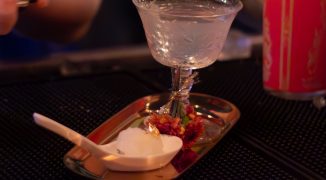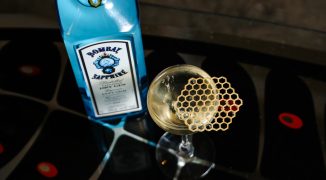During Tales 2017, I had the good fortune to attend “Intellectual Property Law Issues in Cocktail Land,” a surprisingly compelling seminar moderated by attorney and cocktail historian Philip Greene that touched on a number of legal concepts that, while somewhat obtuse and counterintuitive, impact bartenders and industry professionals all the time. I have seen more than a few bartenders fret online about whether there are any means to protect their cocktails and other creations from use (or misuse). In the interest of disseminating this highly valuable information as widely as possible, here are some of the more important things that I learned.
Terminology
There are several legal mechanisms for intellectual property protection in the bar world (and the world at large). Laypeople tend to use the terms for these mechanisms interchangeably, though, and this can lead to some confusion. Here are the basics:
Patent
A patent is used to protect an invention. This can be a unique tool or type of drinking vessel, or a specific technical process. Create an ice mold in a fun new shape or a novel new technique for clarifying juice and a patent is perfect for you. (Recipes, it should be noted, cannot be protected with a patent.) Patents last for 20 years, regardless of use.
Trademark
Trademarks protect brand identifiers. Product names (Budweiser), slogans (King of Beers), sounds (that gratifying sound Apple computers make when they boot up), and a host of other signifiers can be considered trademarks. Trademarks don’t expire as long as they are in continued use. A named cocktail can be a trademark, which can offer some control over how it is used, but cannot necessarily prevent its use.
Interestingly, you don’t have to create a thing to claim it as a trademark. If it’s someone else’s creation that has fallen into disuse, you can scoop it up. (The Pegu Club in New York is named for the defunct Myanmar club, a move only possible because the original has been shuttered for many years.)
Copyright
Copyrights are used to protect creative works. Photography, music, and writing can be protected by copyright. Recipes, cocktail or otherwise, cannot, as recipes are considered “facts” and a fact cannot be copyright protected. Copyrights last for a fixed term of years (depending on whether the creation was by an individual or a company employee). That term is typically extended by Congress whenever Walt Disney’s creations come close to becoming available to the public. Copyrights can protect photographs of cocktails, accompanying text in a cocktail book, and the like, but do not apply the protection toward recipes or inventions. “Copyright” is frequently used in error, though, as a catch-all for all of these other legal mechanisms.
It’s worth noting that both trademarks and copyrights vest automatically. If you have an original cocktail that has become tied to the identity of your bar or brand, it can be considered a trademark whether or not you formalize that designation by filing to register it. Trademark rights vest by way of “use in commerce.” Similarly, if I write an article, it doesn’t have to be published to be my intellectual property. As soon as it is written, it’s all mine. Registering something as a trademark or copyright can make it easier to protect your intellectual property, but it isn’t absolutely necessary.
Trade Secret
A trade secret is just that: something that nobody else knows. The formula for Benedictine is a classic example of a trade secret. Tiki bars are among the most famous exemplars of this means of intellectual property protection; everything in classic tiki bars was a secret recipe.
The protection isn’t so much legal as it is practical: I can’t copy something if I don’t know what’s in it. There are some legal protections as well, as long as a reasonable effort is made to protect the secret. (If you tell me the formula for Coke you give up your legal rights if I start to use it as my own. If, however, I break into Coca Cola headquarters and steal it from your safe, I don’t get to use it.) This can be used to protect cocktail recipes — to an extent. Anyone selling a food or beverage product is legally required to disclose the ingredient list, but not the ratios. Erin Rose will tell you all of the ingredients that go into its famous Frozen Irish Coffee, but not how much of each one.
Common Legal Questions About Cocktails
Now that we’ve established some of the basic terminology, let’s look at some common questions about the application of these concepts to cocktail recipes specifically.
If I make a cocktail for a bar where I work and then later leave their employ, can I make them take my cocktail off of their menu?
No, not unless you have a special agreement or understanding with your employer. The “default position” is that intellectual property developed by an employee while on the clock is owned by the company, not by the employee. There is also little they can do to prevent you from using that same drink, or any other drink on their menu, elsewhere. Courtesy, rather than law, requires that you ask permission to use someone else’s drink recipe. Further, trademark law allows for a period of “excused non-use;” a bar might temporarily discontinue offering a drink, but the name shouldn’t immediately “lapse.” For example, McDonald’s occasionally offers “McRib” sandwiches, but when they stop selling it, it doesn’t mean Burger King could swoop in and offer a sandwich by that name. After a couple of years of non-use, though, it might be considered fair game.
If I pay a consultant to make a cocktail list, can I prevent them from selling those same cocktails to another client?
Probably not. Unlike employees, consultants own the rights to their creations by default. If you don’t get a contract in advance that stipulates otherwise, they are free to create a “signature” drink for your bar and then turn around and sell the same recipe to every other bar on the street. (Again, courtesy requires otherwise, but there are no legal restrictions to prevent it.)
Can I stop another bar from making my drink?
Yes and no. Are we talking about “making my drink” and using the same name? Likely yes, if I’ve treated the name as a trademark. Are we talking about “making my drink” but giving it a different name? There’s probably nothing I can do about that, unless my drink is protected by trade secret. If you create a drink and give it a protectable name, and the drink has been in continuous use at your bar, you can claim the drink name as a trademark. As the “brand owner,” you likely COULD take action to prevent them from making a drink using your protected name without your consent, as you can claim that this would dilute your brand. You may also be able to force them to give you credit. If you’re a brand, you can make sure they use your brand in the drink. (The Bacardi Cocktail is a classic example of a brand successfully forcing bars to use their product when making the drink that bears its name.) But ultimately, if someone knows the recipe to your cocktail, they can use it.
If you do want to fight to keep someone from using something you’ve created, to the extent you can do so, it’s best to move quickly. There’s a legal concept known as acquiescence, which basically means that if you know that someone is using something of yours, but you don’t do anything about it, at some point you lose the right to complain and it essentially becomes a generic term.
A Case Study
The one instance in which a trademark on a cocktail can be strongly enforced is when the cocktail’s trademark is owned by a brand. Bacardi, as we discussed, had some success with this in the early 20th century. More recently Pusser’s, another rum company, owns the trademark for a popular tiki drink called the Painkiller, despite essentially stealing the recipe from a bar in the British Virgin Islands. Not only do they force any bar advertising a Painkiller on its menu to prepare it with Pusser’s, they went so far as to sue a well-liked New York tiki bar that was itself named Painkiller.
In the end, Pusser’s won. Painkiller was forced to change its name (to PKNY, which was close enough to DKNY that it could have become its own issue), cede its web domain, and use Pusser’s in its namesake cocktail. In the end, PKNY went out of business. Other bars, though, in a show of solidarity, started dropping Pusser’s. Pusser’s may have done more to damage its reputation by coming down so hard on Painkiller than it would have by letting the bar Painkiller use the name.
This is one of the few recent cases in which a bar has been affected so dramatically by infringing on a trademarked cocktail. In doing so, the company seeking to protect its brand inadvertently brought on a PR nightmare. This may be why the handful of other brands that own trademarks for cocktails don’t enforce them as strictly. The Sazerac Company makes a lot of noise but does little to force people to use Sazerac Rye when making its namesake cocktail. Gosling’s has had little success trying to do the same with the Dark and Stormy, although they did sue Pernod Ricard for publishing a recipe for the Dark and Stormy with Malibu. Individual bars might be able to get away with it, but another big company trying to use their trademarked cocktail for promotional purposes with a product that isn’t the same style? That’s too far.
If you do want to fight to keep someone from using something you’ve created, to the extent you can do so, it’s best to move quickly.
Key Takeaways
Trying to keep someone else from making your drink is probably not worth the effort.
While it’s possible to keep other bars from using one of your recipes — Tropical Isle has had great success protecting the Hand Grenade — it may not be worth the effort. If you find that another bar is using one of your recipes without permission, I recommend you take it as a compliment and move on, or politely ask for attribution. The seminar was rife with anecdotes about individuals and companies coming to the realization that vigorously protecting their intellectual property rights is often more costly than just letting things slide.
Contracts change everything
The default legal posture can be one thing, but it can be superseded by a contract. You can write into a contract with a consultant, for example, that you get the rights to any cocktail they create. You can also put a nondisclosure or noncompete clause into a contract with members of your staff, which will force them to protect your trade secrets.
Volunteers are there to help
Navigating these waters can feel overwhelming, particularly when you don’t have the means to hire an attorney to sift through it all. I asked the panel for advice on behalf of a friend who recently received a cease and desist letter demanding that she change the name of her business. While she feels that the threat has little merit, she does not have the resources to either comply or to fight. The panel suggested an organization known as Volunteer Lawyers for the Arts, or VLA. They offer pro bono legal services for artists and others caught in intellectual property disputes.
Thanks again to Philip Greene for moderating the seminar (and for helping edit this piece), and to the other members of the panel: John Mason (copyrightcounselors.com), Steffin Oghene of Absolut Elyx, and Andrew Friedman (Scout Spirits). They made an important but potentially boring topic lively and fun.




